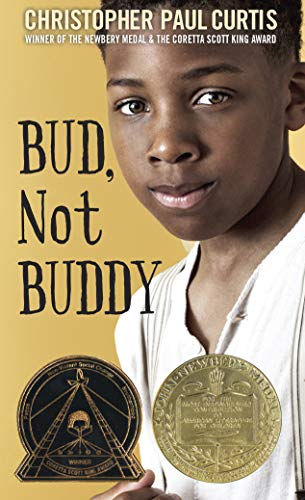
LitPick Review

Orphaned Bud Caldwell finds himself in one unpleasant situation after the next. Convinced that his father is the famed Herbert E. Calloway, a grumpy and reserved jazz musician, he sets out to find his father based off of hints he believes his dead mother left him. The more Bud's supposed father brushes him away, the more Bud and the other jazz band members build a close-knit relationship, giving Bud the home he's been longing for. This book deals with family and home through an endearing and humorous child perspective. Set during the Great Depression, Bud is thrust into a world of soup kitchens, Hoovervilles, freight-hopping, and jazz music.
Opinion:
I remember first reading Bud, Not Buddy by Christopher Paul Curtis when I was nine years old. I read it around the time that I discovered my passion for jazz music, a passion that I have carried throughout my life to this day. What originally intrigued me about this story all those years ago were three things. The first being my fascination with the Great Depression, the second being my enthusiasm for jazz music, and the third being my interest in racial inequality and general discrimination. This book has all of those things. Although I recall enjoying this novel, I did not pick it up again until now, oddly enough for the same reasons that made me originally decide to read it.
My experience reading this novel at sixteen years old in comparison to my experience when I was nine is quite a different one. Although I remembered a few elements of this book before reading it a second time, I mostly only remembered the fact that I liked it. It is clear that Bud, Not Buddy was written with children as its target audience, but this does not mean that it can not still be an entertaining read for all ages. There are serious subjects brought up in this book, while providing a light and childish narration throughout the novel that those not as interested in history can enjoy. I was thoroughly reminded of Adventures of Huckleberry Finn and The Adventures of Tom Sawyer by Mark Twain, when reading this novel.
Seeing as Bud, Not Buddy is narrated by a child, it has a dialogue that is extremely laid-back and not always grammatically correct. I understand that this was an intentional effect made by the author and is part of the character's personality, but it drew me out of the writing on a few occasions. I think that the writing style in this book would be better listened to on audio-book as opposed to being read, but this is just my personal preference. I don't think that the writing style is a flaw of the book, it just took me a little longer to get used to the story. This style feels a little forced in some areas, while perfectly representative of the characters and their time period in others.
Christopher Paul Curtis mentions several historical and cultural references throughout his book, varying from fairly in-depth descriptions to throwing them into sentences without fully explaining their meaning and significance in history. This opens up a perfect educational opportunity for either parents or teachers to discuss these topics more with their children or students reading this book.
Overall, I feel that Bud, Not Buddy by Christopher Paul Curtis would be a more enjoyable read for younger children, but it's a well written historical read nonetheless. This novel is one that adults and older teens can enjoy, but maybe for different reasons than the children reading it might.

